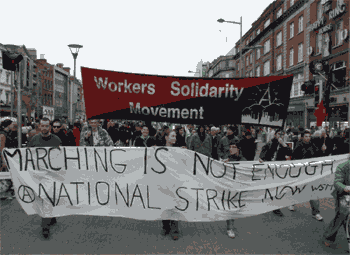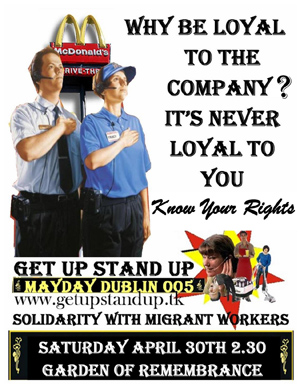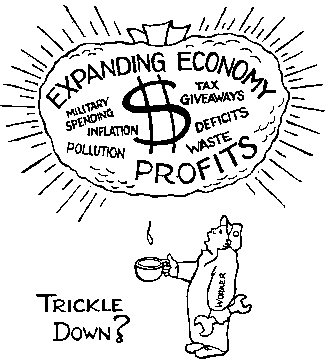Over 30 years of anarchist writing from Ireland listed under hundreds of topics
Workplace
120,000 workers march through Dublin - National strike now!
 On Saturday 120,000 workers marched through Dublin demanding the the public sector pay cut ('pension levy') be withdrawn, that jobs cuts be opposed and that all the other attacks on the working class be ended. Over the last couple of weeks there have been dozens of local union meetings of workers in the public sector demanding strike action to halt the cuts. The march was a chance not only to put pressure on the government but also to demand that our unions do the only thing that can halt the cuts, call a national strike.
On Saturday 120,000 workers marched through Dublin demanding the the public sector pay cut ('pension levy') be withdrawn, that jobs cuts be opposed and that all the other attacks on the working class be ended. Over the last couple of weeks there have been dozens of local union meetings of workers in the public sector demanding strike action to halt the cuts. The march was a chance not only to put pressure on the government but also to demand that our unions do the only thing that can halt the cuts, call a national strike.
The WSM met up to leaflet the march at 1.30 at the Parnell monument, and then joined the demonstration with a banner demanding a National Strike. Here we present reports, interviews with and photos from WSM members who took part on the demonstration and the leafletting as well as background articles on the nature of the crisis
Thoughts on the crash and the alternatives
 Our government has become more and more open about their plans for us. Cowen wants to drive down our living standards 12% and has already cut all our wages through the tax levy and slashed the wages of workers in the public sector further through the so called ‘pensions levy’. He openly talks of “four more years of even steeper cuts”. He is so confident of us taking this lying down that he had the cheek to announce his intention to drive down our living standards at what even RTE referred to as the “Dublin Chamber of Commerce's lavish AGM dinner which cost €160” a head.
Our government has become more and more open about their plans for us. Cowen wants to drive down our living standards 12% and has already cut all our wages through the tax levy and slashed the wages of workers in the public sector further through the so called ‘pensions levy’. He openly talks of “four more years of even steeper cuts”. He is so confident of us taking this lying down that he had the cheek to announce his intention to drive down our living standards at what even RTE referred to as the “Dublin Chamber of Commerce's lavish AGM dinner which cost €160” a head.
Precarity: An Introduction to a Word
 Precarity is a term synonymous with precariousness. It is perhaps best conceived as chronic insecurity. In recent times with the dismantling of the welfare state, the destruction of social security, workers’ existence is becoming more and more insecure. Precarity is a term that has been developed to describe these changes and the new form of working class existence that has developed due to them.
Precarity is a term synonymous with precariousness. It is perhaps best conceived as chronic insecurity. In recent times with the dismantling of the welfare state, the destruction of social security, workers’ existence is becoming more and more insecure. Precarity is a term that has been developed to describe these changes and the new form of working class existence that has developed due to them.
The Nomad, the Displaced and the Settler: Work in the 21st century
 In many countries there has been a debate as to the nature of the changes in western workplaces; in Britain they talk about increased casualisation of the workforce, in the US they talk about contingent labour and on the European continent they use the language of precarity. Central to in all these debates is the issue of job insecurity.
In many countries there has been a debate as to the nature of the changes in western workplaces; in Britain they talk about increased casualisation of the workforce, in the US they talk about contingent labour and on the European continent they use the language of precarity. Central to in all these debates is the issue of job insecurity.
A number of issues are being discussed. Firstly has the workplace changed fundamentally such that people increasingly are in temporary work rather than permanent work? Secondly is the division between work time and non-work time dissolving, are we spending more of our lives 'in work'? Thirdly are the non-work aspects of life becoming increasingly insecure?
An anarchist introduction to trade unions
TRADE UNIONS were founded to defend the interests of workers, but today have become more and more dominated by an unaccountable, and often unelected, bureaucracy. Trade unions - or at least their leadership - have been co-opted into becoming partners with Capital, and see their role as managing their members, controlling difficult situations rather than leading struggles. You are much more likely to see a trade union official selling the management's latest "productivity package" or "re-structuring deal" than to hear him/her calling for an occupation of a plant to avoid its closure, or for industrial action to fight redundancies.Given this, one might wonder why anarchists spend so much time talking about and working inside the trade unions. To write off trade unions, however, is to ignore the basic fact that for a worker to join a trade union means having to recognise, to some degree, that he or she has different interests to the bosses.
Anarchists and the trade unions - Be active - be involved
Trade Unions are important organs of the working-class. Gregor Kerr - a member of the Irish National Teachers Organisation who has been involved in campaigns against "social partnership" and in many strike support groups - argues that trade union involvement should form a central part of the political activity of all anarchists.
The Dunnes Strike & Managing Change - the two souls of the trade union
For three weeks, in June-July 1995, nearly 6,000 mostly young and part-time workers struck against Ireland's largest private sector employer, the firmly anti-union Dunnes Stores, over Sunday trading, zero-hours contracts, the proportion of full-time jobs and other issues. But the principal, and unstated, issues were probably union recognition and the organisation of the newly emergent semi-casual, part-time, young (and mainly female) section of the labour force. The result, while disappointing on the concrete 'economic' issues, was generally greeted as something of a breakthrough on the latter 'political' issues.
Union activists are facing new management attacks but the trade union leadership speaks only of partnership with the bosses. Des Derwin, member of the Executive of the Dublin Council of Trade Unions and of the Dublin Private Sector Regional Executive Committee of SIPTU gives his personal view on the two souls of the unions.
The role of management in workplace accidents
Accidents rarely happen. They are caused. It is equally the case that workers end up taking more than their fair share of blame when things do go wrong. Such has been the case with a host of rail and air accidents over the years, where drivers and pilots have quickly been targeted by the media. But when management is to blame, as is the case with just as accidents, the same light of media exposure rarely shines as brightly or for as long. It's not difficult to see why.
Lessons of Trade Union Fightback
Following the vote on the Programme for Competitiveness and Work at the end of March 2004, the Trade Union Fightback (TUF) campaign was wound up. Here Gregor Kerr, an INTO member who was secretary of TUF, looks at the history and lessons of the campaign.Following the vote on the Programme for Competitiveness and Work at the end of March 2004, the Trade Union Fightback (TUF) campaign was wound up. Here Gregor Kerr, an INTO member who was secretary of TUF, looks at the history and lessons of the campaign
The Dublin Lock-out of 1913 and the ITGWU
In 1913 militant trade unionism had a tremendous task ahead of it. The poverty of manual workers was appalling. The death rate in Dublin, 27.6 per 1OOO, was as high as Calcutta's, The slums were the worst of any city in either Ireland or Britain. 20,108 families were recorded as living in a single room. An Irish Times editorial commenting on a report about Dublin housing wrote that "28,000 of our fellow citizens live in dwellings which even the Corporation admits to be unfit for human habitation. Nearly a third of our population so live that from dawn to dark and from dark to dawn it is without cleanliness, privacy or self respect. Sanitary conditions ruled out ordinary standards of savage morality''

